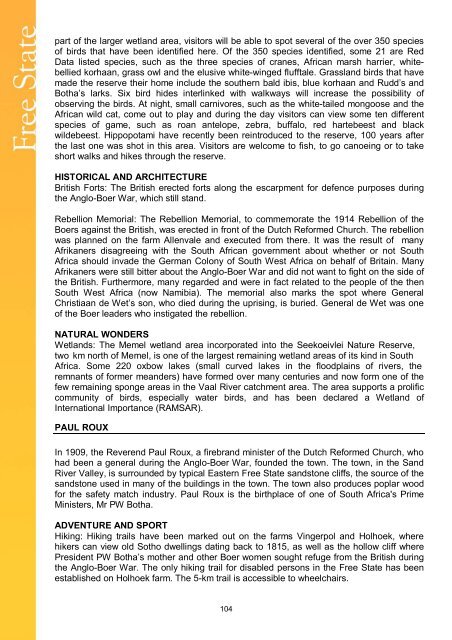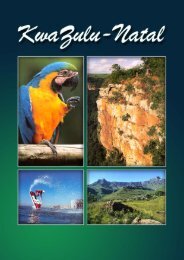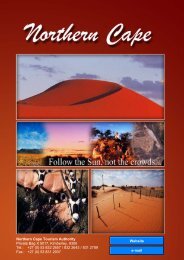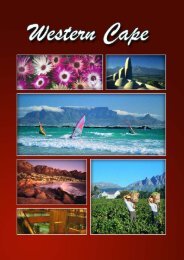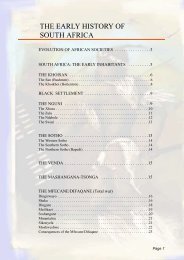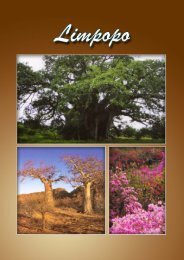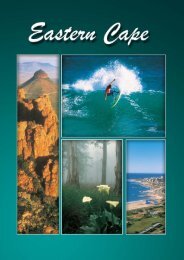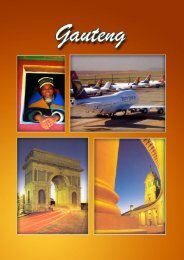Free State provincial article - South African Vacations
Free State provincial article - South African Vacations
Free State provincial article - South African Vacations
You also want an ePaper? Increase the reach of your titles
YUMPU automatically turns print PDFs into web optimized ePapers that Google loves.
part of the larger wetland area, visitors will be able to spot several of the over 350 species<br />
of birds that have been identified here. Of the 350 species identified, some 21 are Red<br />
Data listed species, such as the three species of cranes, <strong>African</strong> marsh harrier, whitebellied<br />
korhaan, grass owl and the elusive white-winged flufftale. Grassland birds that have<br />
made the reserve their home include the southern bald ibis, blue korhaan and Rudd’s and<br />
Botha’s larks. Six bird hides interlinked with walkways will increase the possibility of<br />
observing the birds. At night, small carnivores, such as the white-tailed mongoose and the<br />
<strong>African</strong> wild cat, come out to play and during the day visitors can view some ten different<br />
species of game, such as roan antelope, zebra, buffalo, red hartebeest and black<br />
wildebeest. Hippopotami have recently been reintroduced to the reserve, 100 years after<br />
the last one was shot in this area. Visitors are welcome to fish, to go canoeing or to take<br />
short walks and hikes through the reserve.<br />
HISTORICAL AND ARCHITECTURE<br />
British Forts: The British erected forts along the escarpment for defence purposes during<br />
the Anglo-Boer War, which still stand.<br />
Rebellion Memorial: The Rebellion Memorial, to commemorate the 1914 Rebellion of the<br />
Boers against the British, was erected in front of the Dutch Reformed Church. The rebellion<br />
was planned on the farm Allenvale and executed from there. It was the result of many<br />
Afrikaners disagreeing with the <strong>South</strong> <strong>African</strong> government about whether or not <strong>South</strong><br />
Africa should invade the German Colony of <strong>South</strong> West Africa on behalf of Britain. Many<br />
Afrikaners were still bitter about the Anglo-Boer War and did not want to fight on the side of<br />
the British. Furthermore, many regarded and were in fact related to the people of the then<br />
<strong>South</strong> West Africa (now Namibia). The memorial also marks the spot where General<br />
Christiaan de Wet’s son, who died during the uprising, is buried. General de Wet was one<br />
of the Boer leaders who instigated the rebellion.<br />
NATURAL WONDERS<br />
Wetlands: The Memel wetland area incorporated into the Seekoeivlei Nature Reserve,<br />
two km north of Memel, is one of the largest remaining wetland areas of its kind in <strong>South</strong><br />
Africa. Some 220 oxbow lakes (small curved lakes in the floodplains of rivers, the<br />
remnants of former meanders) have formed over many centuries and now form one of the<br />
few remaining sponge areas in the Vaal River catchment area. The area supports a prolific<br />
community of birds, especially water birds, and has been declared a Wetland of<br />
International Importance (RAMSAR).<br />
PAUL ROUX<br />
In 1909, the Reverend Paul Roux, a firebrand minister of the Dutch Reformed Church, who<br />
had been a general during the Anglo-Boer War, founded the town. The town, in the Sand<br />
River Valley, is surrounded by typical Eastern <strong>Free</strong> <strong>State</strong> sandstone cliffs, the source of the<br />
sandstone used in many of the buildings in the town. The town also produces poplar wood<br />
for the safety match industry. Paul Roux is the birthplace of one of <strong>South</strong> Africa's Prime<br />
Ministers, Mr PW Botha.<br />
ADVENTURE AND SPORT<br />
Hiking: Hiking trails have been marked out on the farms Vingerpol and Holhoek, where<br />
hikers can view old Sotho dwellings dating back to 1815, as well as the hollow cliff where<br />
President PW Botha’s mother and other Boer women sought refuge from the British during<br />
the Anglo-Boer War. The only hiking trail for disabled persons in the <strong>Free</strong> <strong>State</strong> has been<br />
established on Holhoek farm. The 5-km trail is accessible to wheelchairs.<br />
104


